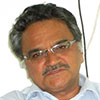The presence of too many intermediaries have given rise to the agency problem wherein facts are distorted and issues of the public remain unaddressed
No, this is not about Modi's expanding girth.
It's about how archaic are our systems for "group think" on public affairs. It is not only about having to elect an MP, an MLA or a councilor to represent us. “Group think” systems are institutionalised at various levels. In business and industry we have the federations and chambers which presumably represent business and trade unions which represent labour; in politics we have political parties; in communities we have civil society organisations which claim to represent specific interest groups and of course every religion has its own management hierarchy.
Most of us have neither the time nor capacity to contribute full time to public affairs and hence, the need for a set of intermediaries to manage interest groups in public affairs. The question really is do we have too many people doing too little for us? Are intermediaries distorting our messages? Are we victims of the “agency problem” where the representative becomes the boss of the owner?
Can direct democracy help? Yes it can. Direct democracy cuts out the “noise” of middlemen by giving voice to citizens. Direct democracy can work, even in a continent sized, heterogeneous country like India, thanks to social media technology. In the world of IT, the strategy for managing a social problem, like high crime rates, is developed by convening a “hackathon”. This is a gathering of concerned citizens, who define the problem; babus, who identify the administrative constraints and geeks, who create tech solutions like marking crime spots on a street map to check if crime clusters around poorly lit streets or is time sensitive.
By defining the problem narrowly the solutions become simpler. The application “Ushahidi” improves policing by crowd sourcing data to pinpoint violence (Kenya 2008) or enhances disaster management by identifying emergency hot spots (Haiti 2009).
Here are some options to cut the democratic flab:
1. Why is it necessary for MPs and MLAs to attend parliament/assembly by being physically present? Why don't they participate via video conferencing from their constituencies? Technologically, this presents no problems since most districts and blocks are now connected to broadband. Consider how this could solve the “agency problem”. MPs could not play hooky, as they do today, if they were on camera. Imagine the sense of citizen participation, as MPs debate from their homes, whilst surrounded by their adoring and watchful constituents. This can cut the flab from parliament by saving on travel cost and eliminate the time wasted in trooping into the well. Parliament would become as dry and efficient as a modern stock exchange, where people come to transact business not engage in theatrics. Also, consider the number of productive jobs that would be created across the country to expand the enabling IT eco-system.
2. Many of the issues, which are debated in parliament/assemblies, can be better informed by mobile phone based surveys conducted by a third party. Currently, mobile ownership is at 70 percent of households (with rural households lagging) but ownership is growing fast and should be encouraged for a variety of social purpose applications, including mobile money. What do Indians think about the need for a specific rape law? Should political parties come under the RTI? Should there be minimum academic qualifications for MPs? These matters are far too important, to rely on Rahul Gandhi to intervene, on our behalf (as he did in the case of the criminal bachao ordinance) every time. In any case, we don't want to “rely” on anything except our “group common sense” to guide babu actions via legislation.
3. Decisions are best taken closest to the people affected by them. This is the time tested management axiom of “subsidiarity”. This implies large scale decentralisation of decision making powers and finance from the central and state government onwards to district and block level elected bodies, where 85 percent of the elected officials are located but who have less than 5 percent of the powers. Decisions become less complex and easier to implement as the extent of heterogeneity decreases. The options and trade-offs are easier to understand to take a rational decision. The level of citizen participation is always higher because the issues are more immediate and relevant. Decentralised decision making fosters innovation and creativity. All these are good reasons for pushing decentralization without any enhanced fiduciary risk, which a technology enabled public financial management system can ensure.
The RTI Act was the first “breach in the Bastille” which improved “access to information”. The second barrier awaiting removal is the noise of flabby “agents/representatives”, via whom citizens are forced to voice their opinions in public debate. Technology can help us to reduce the transaction cost and enhance the prospects for direct participation. Phone lagao, desh bachao.
The column first appeared on the author's blog (http://ahlu-india.com/).
